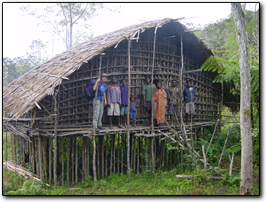
Anggi Lakes (Part 2)
The next morning, the family awoke before dawn with more chants and prayers. The mother and father discussed something important between themselves. All we could understand was the number “300”. Anne gave them her sweater along with some other small items that we didn’t need anymore. After giving him some tobacco, our host demanded that we pay him 300,000 Rp (about $30) for staying in his traditional house! Until now we had been giving people in the Anggi lakes area $2-3 for allowing us to stay with them. After a heated discussion, we agreed to pay the equivalent of $2, but not until they had rowed us across the lake.
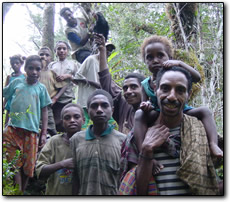
Once across the lake, the trail was easy to follow. The next village was about five hours away. We walked through thin cloud forest and open marshy flats with pitcher plants. Along the trail we ran into a group carrying produce to sell at the lake. One of the women had a baby “tikus pohon” (a kind of tree kangaroo) in her hand. Anne asked if she could take a picture of it, but the woman ran away, frightened. Everyone else lined up, pleased to pose for a group photo. After winding through the high forest, the trail crossed a ridge, then dropped steeply into a large, forested valley dotted with villages and fields. We walked through banana plantations and potato fields to the nearest large village. Most of the people on the trail couldn’t really understand what we were doing there without a guide. They seemed suspicious, asking us over and over what we were looking for. We didn’t like the atmosphere in the large village, so we asked how far it was to the next one. They told us that it should take about five hours, and that the trail was easy to follow. We still had time, so we headed down the valley. The trail dropped into a gorge, followed the river for a while, then started to climb. At first we thought that it was shortcutting a bend in the river, but the trail continued to climb up and away from the valley. We had not seen any branches, so we continued. There was trash at the major stopping points, so locals returning from shopping trips in town must have passed. We climbed through dense, ancient forest, heading for a notch in the hills ahead. The flanks of the Arfak Mountains, covered with luxurious green canopy, spread out on either side. After a few hours of hard climbing, sometimes along narrow paths with steep drop-offs, we emerged at the pass. The forest was too thick to see our destination below. How much longer would it be? The trail wound its way down through the tall trees. The treetops were full of birdcalls. After several more hours of walking, we passed some boulders, then, as the trail dropped, we could hear rushing water. Below was a river junction. Sitting on the rocks around a smoking fire was a group of naked Papuans! They quickly spotted us and started calling. Soon a couple of boys joined us on the trail. Excited to guide tourists to their village, they set off at a rapid pace down the path. What was only supposed to be a few minutes to the next settlement turned out to be more than half an hour. Exhausted after a full day of hiking, we longed for a bath. In the village everyone crowded around, looking us over. They seemed friendlier than the other villages we had passed. One elderly man asked us where we were from. When Anne replied “Swiss” (Indonesian for Switzerland) he asked, “is that part of Indonesia?” There was no village chief, but the Sunday-school teacher offered to put us up in his wooden house. Eric went to wash in the nearby river. A group of about ten boys accompanied him, and watched his every move as he washed his face, arms and legs. He had to shoo them away before taking off his underwear, washing and putting on a clean pair.
Back in the village, we were left in peace to cook some dinner over the fire at the back of the house. Anne found a pack of MSG and told our hosts how bad it was for health. After eating we noticed that the entire village had crowded into the one-room house, eager for the novelty of having tourist guests. Noticing that one of the boys was holding a kind of homemade lute, we asked the children to sing us a song. At first they shifted shyly and avoided our gaze, but then one of the braver boys started, and soon the entire room was chanting religious songs and clapping their hands. In return, we sang some songs in English and French. The crowd went wild, and began chanting again with renewed energy. After a few rounds of chanting and singing, we made it clear that we were tired and wanted to sleep. Getting the hint, the villagers filed out, leaving us, the Sunday-school teacher, his wife and two small children. We hung our mosquito net from the ceiling, unrolled our mattresses and tried to sleep.
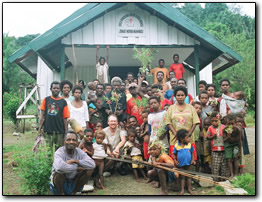 |
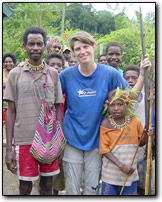 |
After breakfast the next morning we gave the rest of our rice to our hosts. We peeked out the front door and noticed that most of the village was waiting for us to emerge! As soon as they saw that we were awake, they filed into the house again. We asked where the children went to school. After the local schoolhouse had been wiped out by an avalanche, the village elders started teaching the children their ABCs. They showed us picture books with words in Hatam, such as butterfly, noken (string bag) and pig. They asked us about freedom for Papua, then told us how, in 1968, guerillas from Manokwari had fled into the nearby forest, fighting against the Indonesian army with bows, arrows and a few leftover rifles from World War II. Some hid in the caves that we had passed on the trail the previous day. The Indonesian army had killed our host’s father. Had they killed most of the adult men at that time? Perhaps that was why there was only one old man in the village.
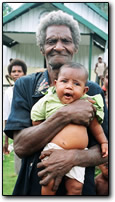 |
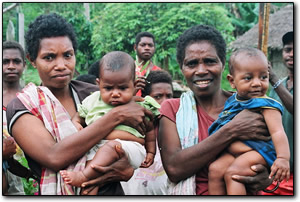 |
Before leaving, the village gathered to take a group photo in front of the church. The young boy who had led the singing the night before emerged wearing a dog-tooth necklace. We took a picture of the oldest man in the village holding the youngest child. A man from a nearby settlement agreed to show us the way to the main road. We followed him back to civilization as he walked barefoot on the rocky trail.
From Manokwari we flew to Manado via Sorong. The interior of the bird’s head looks just as hilly, forested and remote as elsewhere in Papua. Only around Sorong do any signs of logging appear. Durian, normally not in season in Indonesia in the summer, was available everywhere on the streets in Sorong. We bought ourselves a small one and ate a hearty grilled-fish dinner at one of the local warungs before retiring to a (relatively) luxurious Chinese-run hotel.
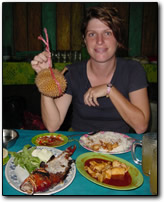 |
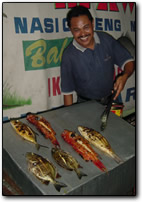 |
